WEC
Arrival of the JOTA – 24 Hours of Le Mans
With JOTA becoming the first privateer team to win a race in WEC, It sets its sight at the next big step-overall victory at the 24 Hours of Le Mans.
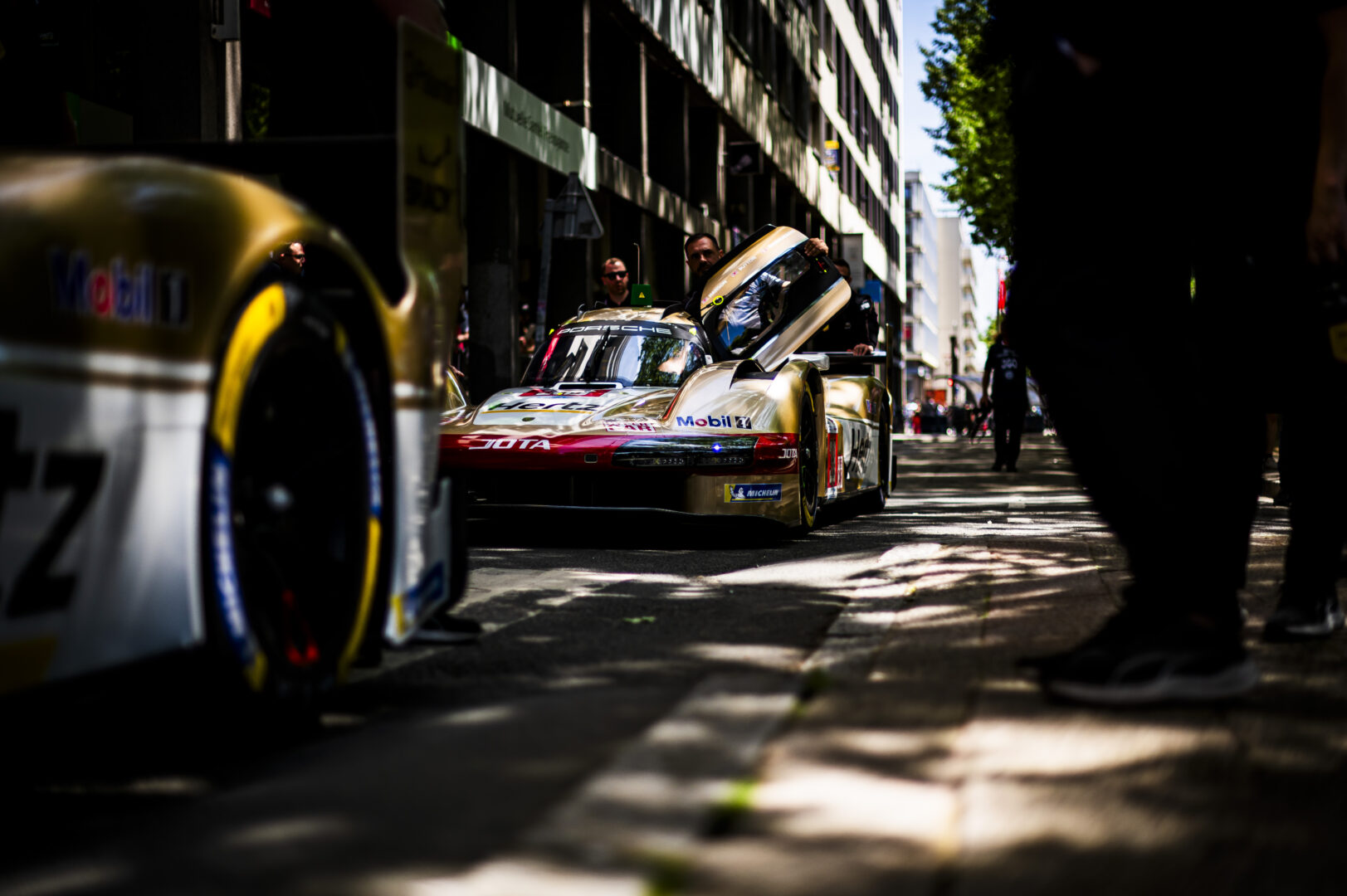
The last time the WEC paddock went racing, A completely new name came at the top step – Hertz Team JOTA. With victory at the 6 Hours of SPA-FRANCORCHAMPS, JOTA became the first privateer team to taste the champagne of victory in the WEC. Now that they have broken one record, they aim for the next big win- the coveted TOP STEP at 24 HOURS OF LE MANS.
But how exactly did a small team who started in a modest Honda Integra, reach the most prestigous stage in endurance racing? This article is the story of the Arrival of the JOTA.
The Team
Started by Sam Hignett and John Stack in 2000, the first racing series they participated in was the 24 Hours of Nurburgring and the Spa 24hrs in a Honda Integra. Starting from 2000, they participated in various series like FIA Sportscar Championship, American Le Mans Series and Le Mans Endurance series.
They had their 24 hours of Le Mans debut with a Zytec 04S in the year 2005.
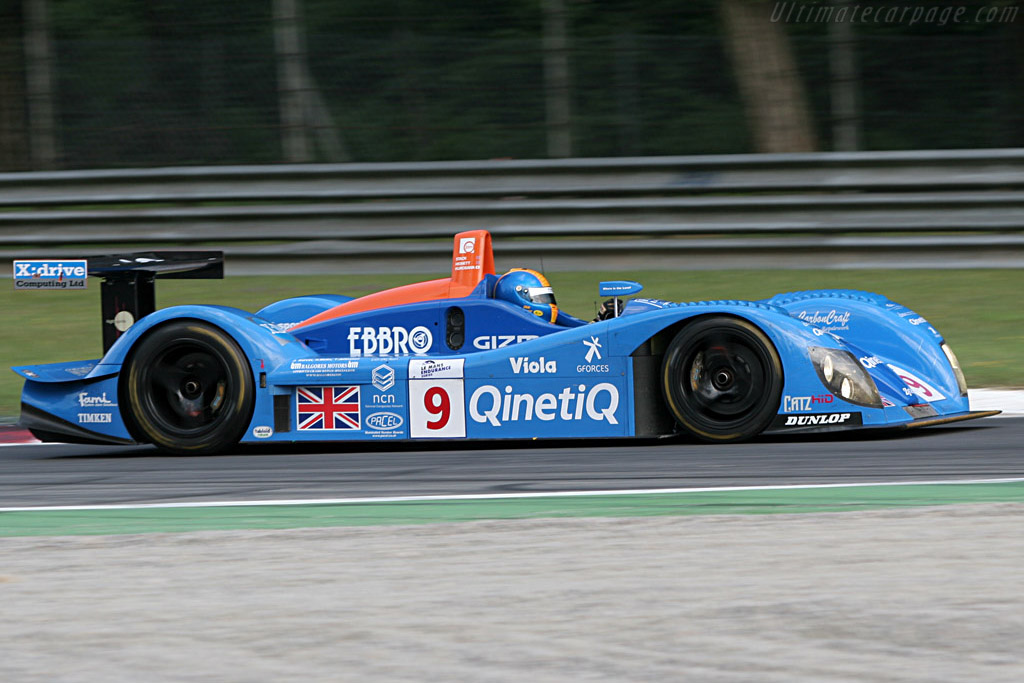
Piloted by Sam Hignett, Haruki Kurosawa and John Stack, they were running in fifth position until hour 22. After which they retired from the race due to an accident on track.
First Wins
The following years saw Team JOTA try its hands at Porsche Carrera CUP(2008) alongside the ALMS as well as the 24 Hours of the Le Mans. Come 2010, JOTA became the official partner of Aston Martin Racing. They participated in the Spa 24 Hours(1st place) and Britcar Silverstone 24 Hours(2nd place) with an GT4 Aston Martin.
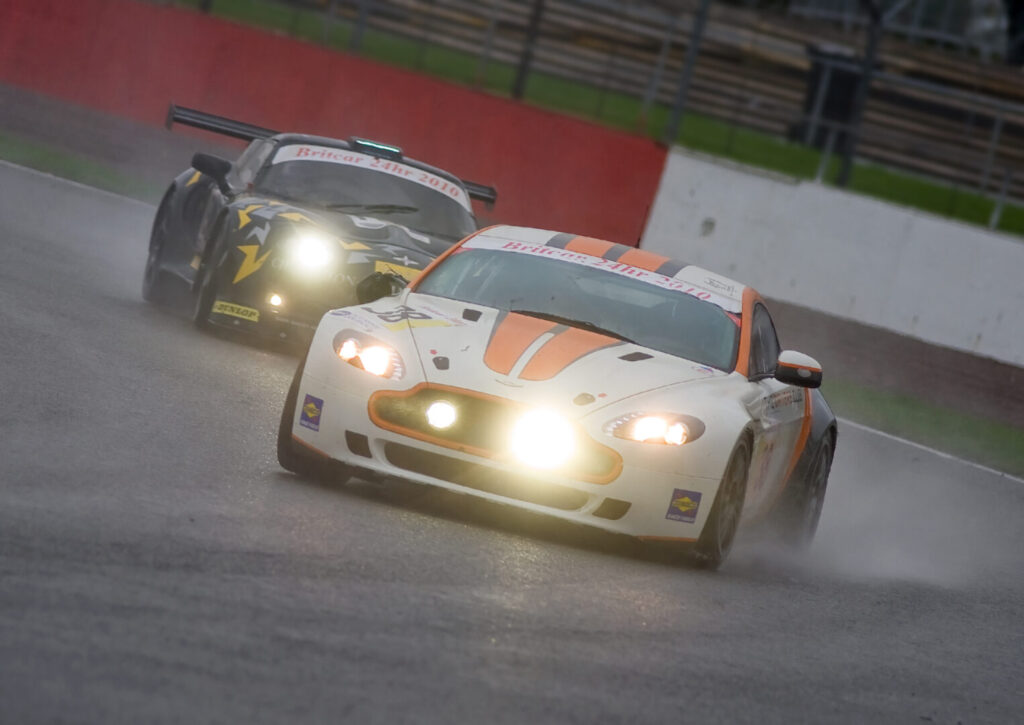
At the 2011 24 Hours of Le Mans, JOTA entered with an Aston Martin GT2 in GTE Pro class but they wouldn’t finish the race due to engine issues. Their first taste of victory at Le Mans came at the 2014 race. With Simon Dolan, Harry Tincknell and Oliver Turvey at the wheel of a Zytec LMP2 machine, the British team was placed 5th overall and 1st in class.

Their next win would only come at the 2017 edition, this time partnered with Jackie Chan DC racing in LMP2 category in the Oreca 07 Gibson.
Porsche customer program
JOTA Sport continued to contest in the LMP2 category until 2023, when they announced their association with Porsche for a customer LMDh programme.
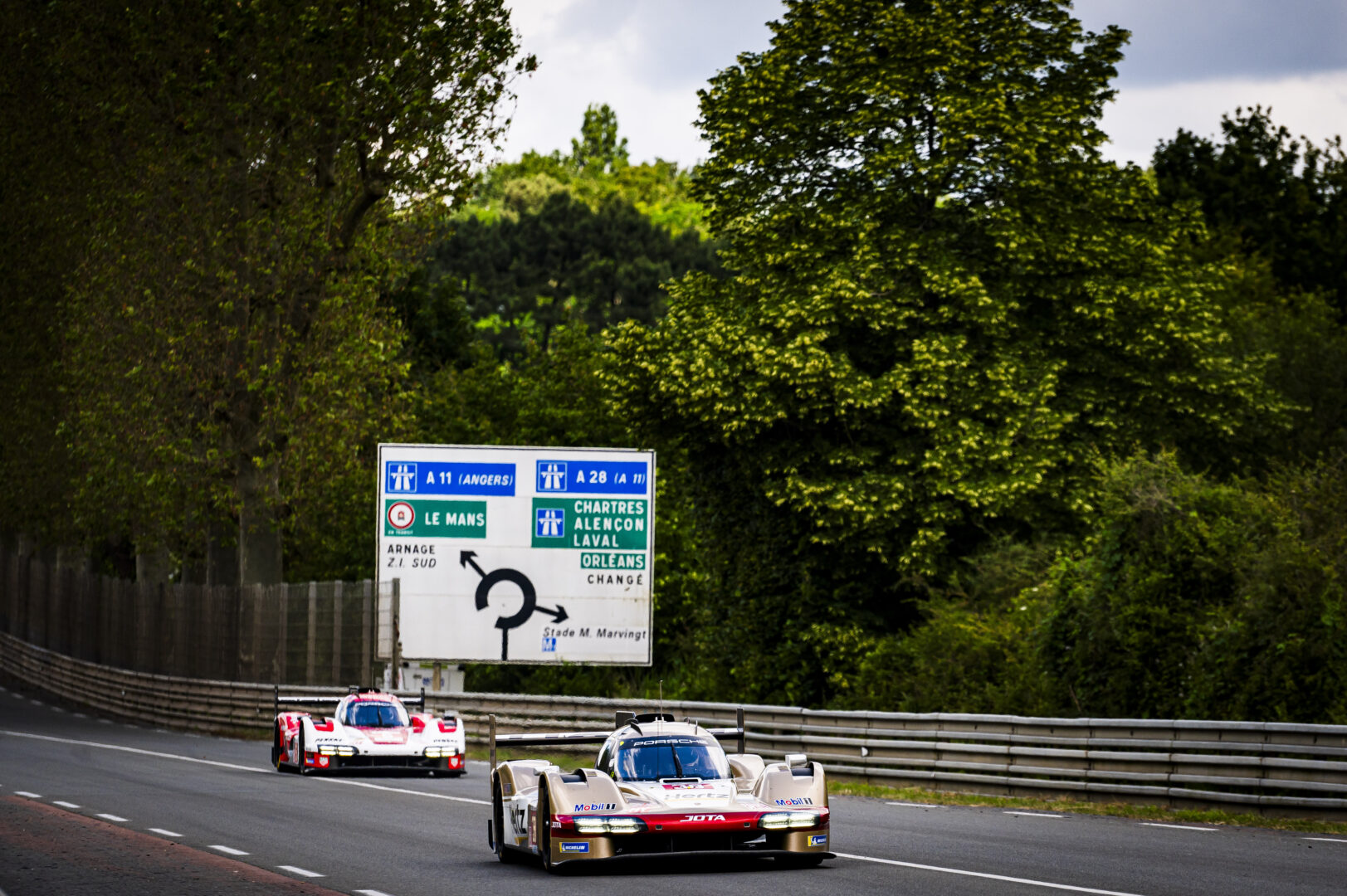
With the customer Porsche 963 delivered to JOTA only by the third round of Spa, they were on the back foot at the start of the season. But come the season end, at the last race in Bahrain, they were battling with giants like Ferrari for on-track positions.
2024 season
Porsche and JOTA started the first race of the season strong. It was an all Porsche podium in Qatar with JOTA finishing in 2nd place.
It was at the third race of the season when the number 12 Hertz Team JOTA car crossed the line first, ahead of a fast-charging factory Porsche (no.6). This made JOTA the first privateer team to win the overall race in WEC.
With the Porsche 963 looking strong as ever and Team JOTA riding high on enthusiasm from their win, they would very much like to do themselves one better and win the coveted race at Circuit De La Sarthe.
The Drivers
JOTA is fielding two cars- no. 38 and no. 12 for Le Mans.
#38 – Oliver Rasmussen, Philip Hansen, Jenson Button
#12 – William Stevens, Norman Nato, Callum Illot
With a competent crew and world-class drivers already present at their disposal, Team JOTA is looking strong for the weekend.
But the 24 Hours of Le Mans is much more than a test of the team’s skills. It tests the Car’s hardware, software and even the mental strength of the drivers to keep performing at their level best for a complete 24 hours. It’s a test the top people at Team JOTA would be looking to ace come Sunday evening.
Weekend Schedule
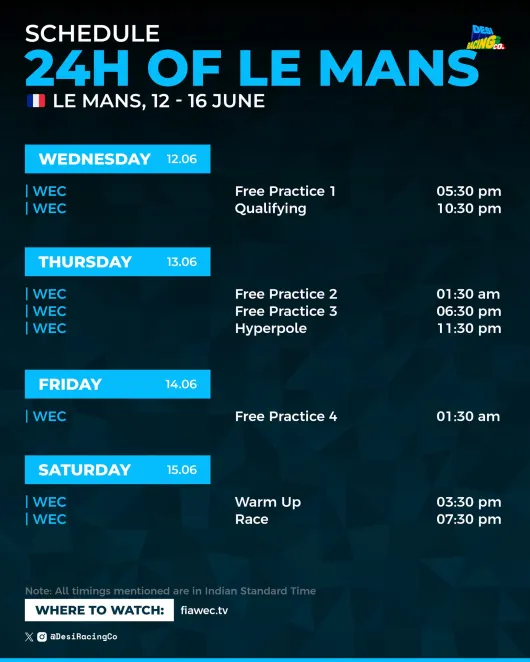
All the sessions will be streamed on Eurosport channel in India.
Click here for the complete entry list of the 24 Hours of Le Mans
Endurance/Sports car racing
WEC 24 Hours of Le Mans: DRC’s Beginners Guide
It is that time of the year again, the most iconic endurance racing is set to commence this weekend in Le Mans. Here is a beginners guide by DRC to help newcomers follow the race.

One of the most gruelling and prestigious races of the motorsports calendar is here, the 24 Hours of Le Mans. As the name suggests, the race goes on for 24 hours nonstop at Circuit De La Sarthe in Le Mans, France. With 62 entries divided between 3 categories, it might get confusing if you’re someone new to all this. This is DRC’s beginner’s guide to one of the biggest races of the year.
History
A secretary general of an automotive group in France, a journalist and an Industrialist got together at the Paris Motor Show at the Grand Palais in 1922. They discussed about an idea for a race, which gave birth to the Rudge-Whitworth 24-hour Endurance Grand Prix and was introduced in 1923. That race then went on to become the spectacle we now know as 24 Hours of Le Mans.
Since then, the 24-hour race has stood the test of time. Even when the circuit was damaged considerably during the Second World War, repairs were made to revive the race after the war was over.

Le Mans has seen its fair share of dominance by manufacturers, but one that stands out from the rest is the domination by Porsche in the 1970s. The German manufacturer holds the record for the most number of wins by a manufacturer, 19. Their closest rival is another German brand, Audi, but even they are 6 wins behind.
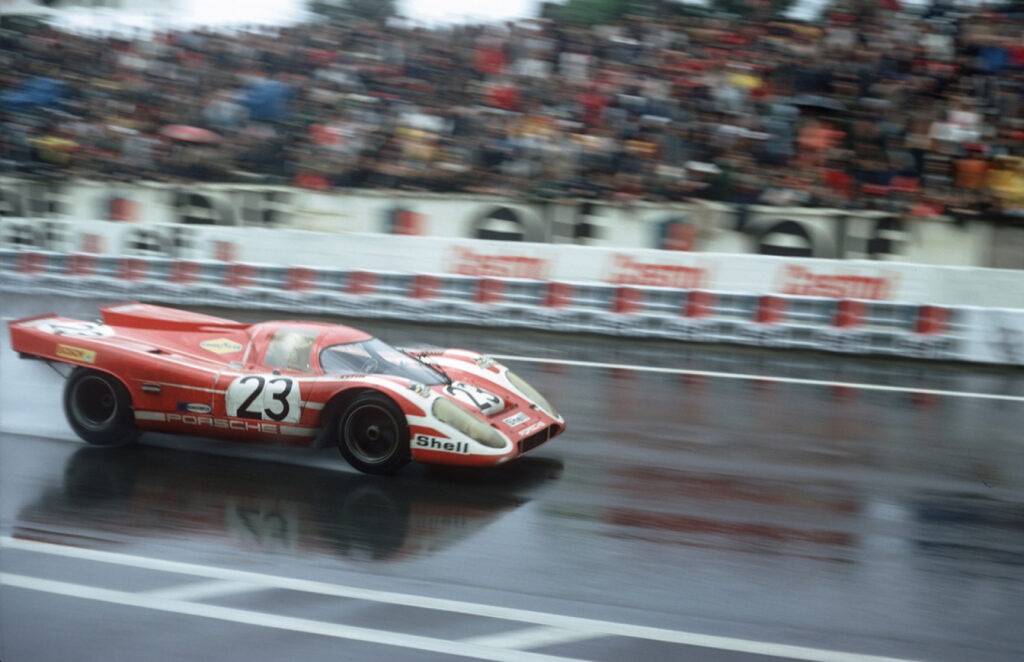
Although endurance racing is a team sport, as you have to share the car with other drivers and every driver is equally responsible for the success of the car and the team, if there is one driver who has dominated Le Mans, it’s Tom Kristensen. The Danish driver has won Le Mans a record 9 times, more than any individual. What makes his record even more impressive is that he has done it with 3 different manufacturers, Porsche, Bentley and Audi.

Where does it happen?
The 24 Hours of Le Mans takes place at the iconic Circuit de la Sarthe in Le Mans. The race uses a semi-permanent version of the circuit, with part of the track comprising public roads that are open for public use throughout the year.
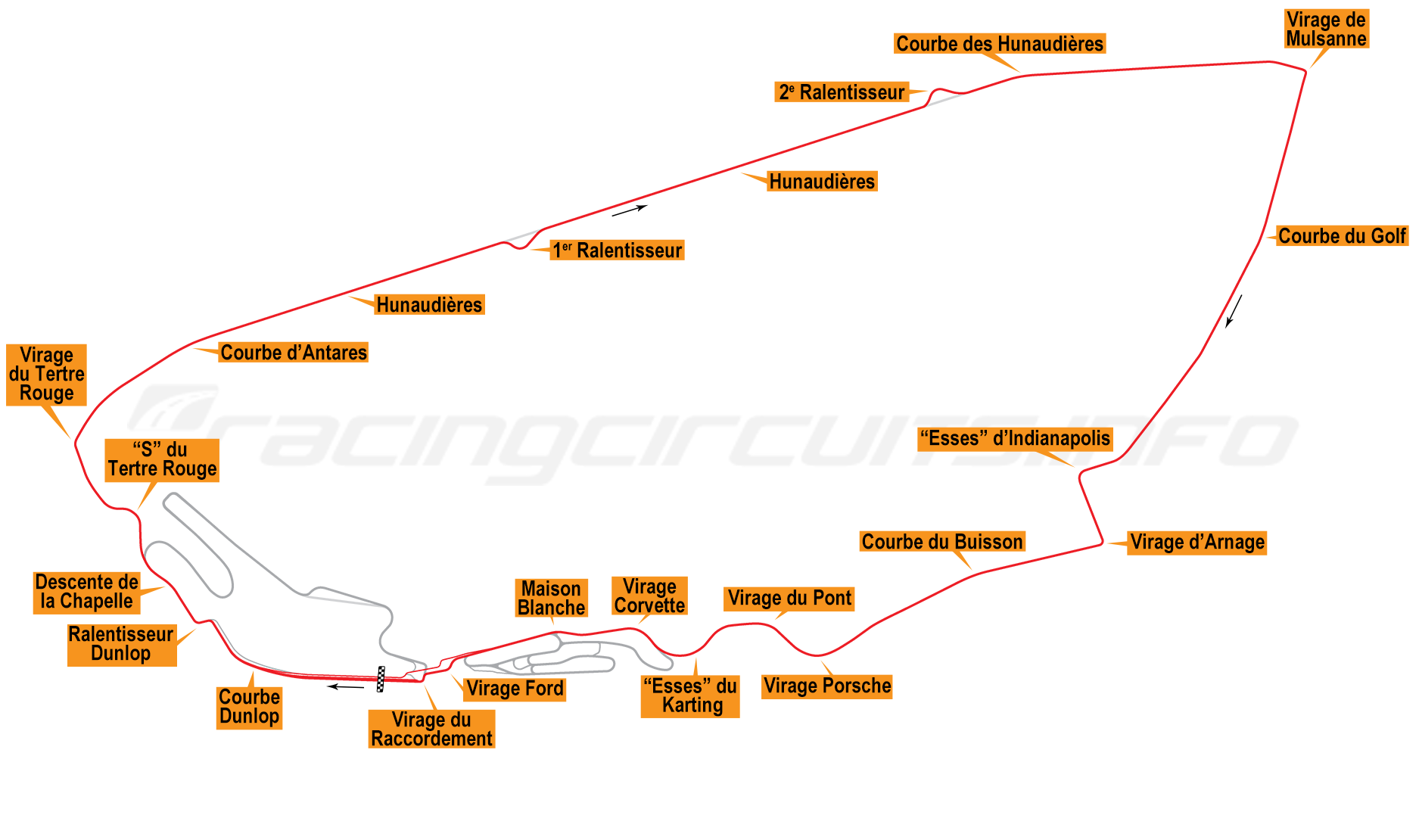
At 13.626 km, it’s one of the longest circuits in the world right now. The circuit has 38 corners, but it also has long straights that can help the cars reach upwards of 320 kmph during the race. A driver spends around 85% of the lap on full throttle, which also means the cars undergo massive braking to slow down in the corners. This makes the circuit and the race a true test of endurance.
The Different Classes Racing in Le Mans
HYPERCARS
In 2021, Hypercars became the top class of the World Endurance Championship and Le Mans, replacing the outgoing LMP1 class. The new class was brought in to close the gap between the top classes of IMSA and WEC, allowing Hypercars from either series to participate in both championships without significant changes. Two types of car compete in the class: the Le Mans Hypercar (LMH) and the Le Mans Daytona h (LMDh).
LMH and LMDh cars compete against each other in the FIA WEC and in the IMSA WeatherTech SportsCar Championship and can therefore enter the 24-hour races at both Le Mans and Daytona.
The major difference between LMH and LMDh is that in LMH, the regulations leave scope for a wide variety of architectures and allow a front-axle hybrid system to be fitted. Meanwhile, in LMDh, the chassis of the car will be supplied by one of four chassis manufacturers: Dallara, Multimatic, Ligier or Oreca.
This year, a total of 21 entries from 8 manufacturers will be competing for top honours at Le Mans.
LMP2
LMP2 or Le Mans Prototype 2 is a closed-cockpit prototype car developed to race in endurance championships. LMP2s compete in the 24 Hours of Le Mans, the European Le Mans Series, the Asian Le Mans Series and the IMSA WeatherTech SportsCar Championship. Although there are 4 different constructors that manufacture LMP2 chassis, this year in Le Mans, all the teams are using the Oreca-07 made by Oreca. Gibson is the sole engine supplier for LMP2s. he selling price of a new car, not including engine or homologated electronic equipment, is capped at €483,000.
One should note that WEC currently does not run LMP2 class, however the 24 Hours of Le Mans has an LMP2 class on an invitational basis.
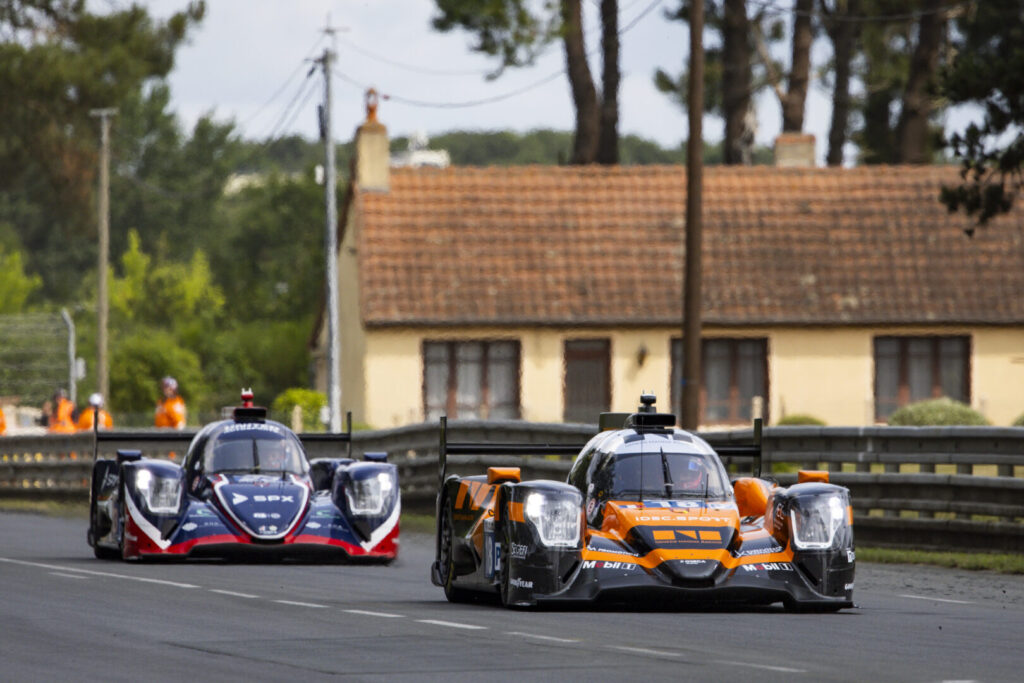
LMGT3
LMGT3s are the new kids on the block. This class was introduced as a replacement for the outgoing LMGTE class and is based on the FIA GT3 platform. Only recognised manufacturers producing over 2,500 vehicles per year for street use are eligible to compete. The cars do have WEC-specific modifications such as luminescent number panels and leader lights.
Privateer teams represent the manufacturers in LMGT3, as no manufacturer has a direct factory team in this class. This year, for Le Mans, we have a total of 24 entries from 9 different manufacturers. It is mandated by the rules to have at least one Bronze driver and one Bronze or Silver driver in the driver lineup.
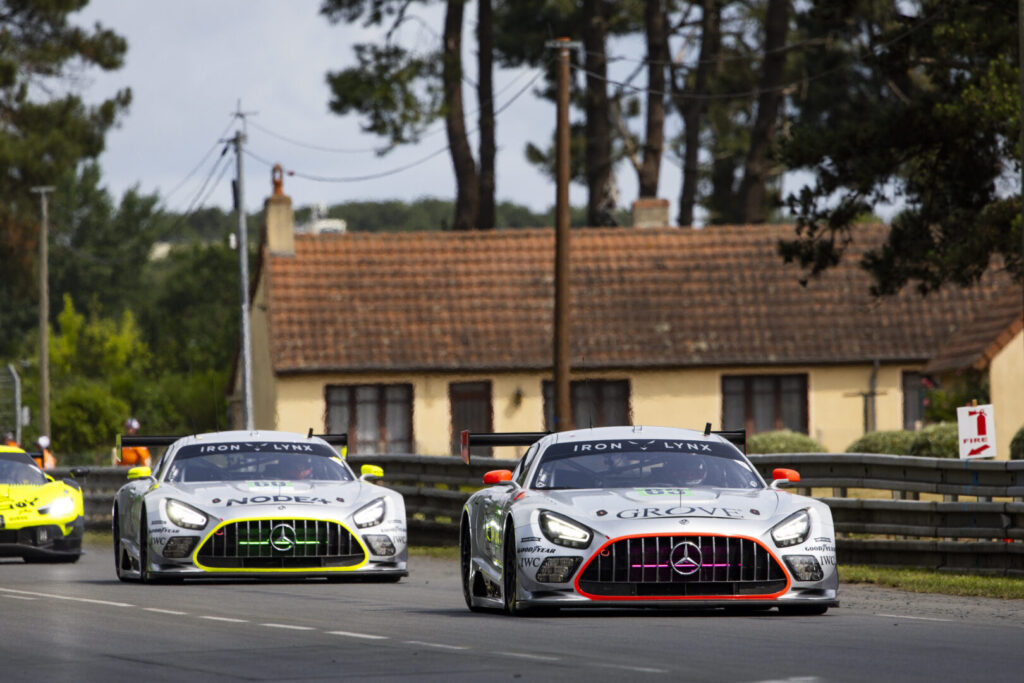
Who to look out for?
There are multiple notable drivers who will be taking part in the 24 Hours of Le Mans this year. From ex-F1 drivers to MotoGP legend Valentino Rossi, you’ll find a lot of familiar faces on the grid for this weekend’s race. In fact, the current leader in the drivers standings of Hypercar is Ex-F1 driver Antonio Giovinazzi.
Drivers you may know:
- #4 PORSCHE PENSKE MOTORSPORT – Pascal Wehrlein
- #7 Toyota Gazoo Racing – Kamui Kobayashi, Nyck De Vries
- #8 Toyota Gazoo Racing – Sébastien Buemi, Brendon Hartley
- #15 BMW M Team WRT – Kevin Magnussen
- #36 Alpine Endurance Team – Mick Schumacher
- #38 Cadillac Hertz Team Jota – Jenson Button
- #51 Ferrari AF Corse – Antonio Giovinazzi
- #83 AF Corse – Robert Kubica
- #93 Peugeot Total Energies – Paul Di Riesta
- #94 Peugeot Total Energies – Stoffel Vadoorne
- #311 Cadillac Whelen – Jack Aitken, Felipe Drugovich, Frederik Vesti
- #22 United Autosports – Pietro Fittipaldi
- #25 Algavre Pro Racing – Theo Pourchaire
- #46 Team WRT – Valentino Rossi

Where to watch 24 Hours of Le Mans in India and the Schedule
You can watch all the WEC action live only on FIAWEC.tv as WEC does not have a broadcaster in India. The schedule for the weekend is as follows:
June 11th – Wednesday
Free Practice 1 – 05:30 PM / 08:30 PM
Qualifying – LMP2 & LMGT3 – 10:15 PM / 10:45 PM
Qualifying – Hypercar – 11:00 PM / 11:30 PM
June 12th – Thursday
Free Practice 2 – 01:30 AM / 03:30 AM
Free Practice 3 – 06:15 PM / 09:15 PM
HYPERPOLE 1 – LMP2 & LMGT3 – 11:30 PM / 11:50 PM
June 13th – Friday
HYPERPOLE 2 – LMP2 & LMGT3 – 12:05 AM / 12:20 AM
HYPERPOLE 1 – HYPERCAR – 12:35 AM / 12:55 AM
HYPERPOLE 2 – HYPERCAR – 01:10 AM / 01:25 AM
Free Practice 4 – 02:30 AM / 03:30 AM
June 14th Saturday
Warm-up – 03:30 PM / 03:45 PM
Race – 07:30 PM / 07:30 PM (June 15th)
Desi Racing Co. is dedicated to bringing the latest updates and insights from the world of motorsport. Whether it’s Formula 1, Formula 2, WEC, MotoGP, Indian motorsports, or other racing series, we’ve got you covered! Stay connected with us for in-depth motorsport coverage. Follow us on Twitter/X/, Instagram, and LinkedIn to keep up with the latest motorsport news and updates.
WEC
Qatar 1812KM: Ferrari and Corvette emerge on top at the WEC curtain raiser
Ferrari dominates with a historic 1-2-3, Corvette storms through the LMGT3 field, and drama unfolds across both classes in a thrilling start to the 2025 World Endurance Championship at the Qatar 1812KM.
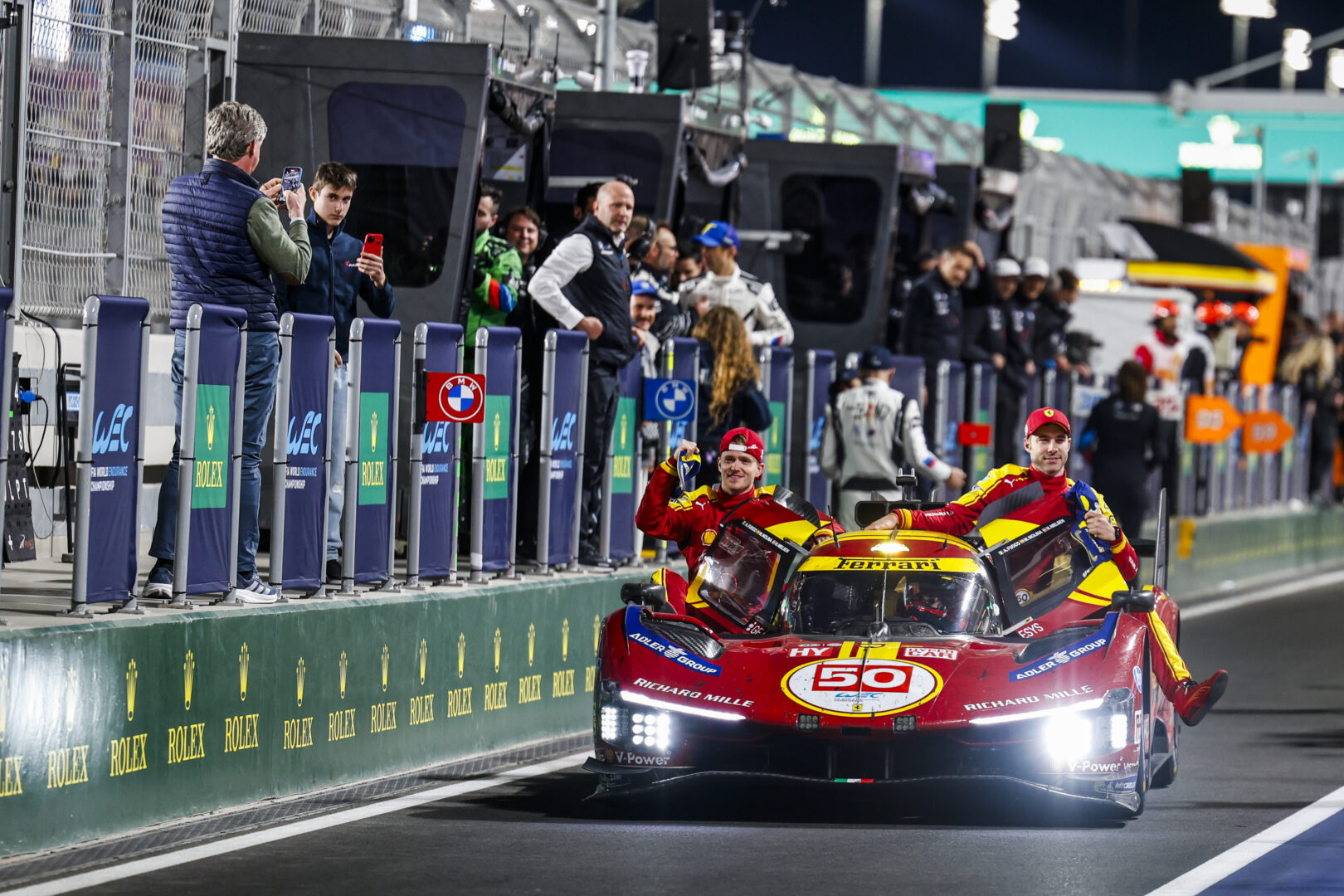
The 2025 World Endurance Championship (WEC) began its season under the desert sun at the Lusail International Circuit in Qatar with the Qatar 1812KM. Ferrari entered the weekend as favourites following their strong showing in pre-season testing, known as the Prologue, and the Italian manufacturer lived up to expectations by securing both pole position and victory, albeit with two different cars.
In the LMGT3 class, it was Corvette Racing that stole the spotlight. The American squad jumped the McLarens of United Autosports, who had locked out the front row, to take the category win in Qatar.
Giovinazzi Takes Pole for Ferrari in WEC Season Opener
If the practice sessions were anything to go by, two things were clear heading into qualifying: it was going to be tight, and Ferrari were the team to beat.
Qualifying did not go as planned for the #8 Toyota as Brendon Hartley spun on his fast lap, failing to advance to hyperpole. It was also a rough qualifying for newcomers Aston Martin, as both their cars were at the back of the grid. Another shocker was that none of the Porsches made it to Hyperpole, the manufacturer last year locked out the podium in Qatar. Advancing to Hyperpole were all the Ferraris, Cadillacs, and BMWs, along with the lone #35 Alpine, #93 Peugeot, and #7 Toyota.

BMW M Team WRT’s Dries Vanthoor was looking quick in Hyperpole, going quickest by nearly half a second with just a little over 2 minutes left on the clock. Alex Lynn then closed the gap to the top, going up to second in the time sheets in his #12 Cadillac Hertz Team Jota. But it was the #51 Ferrari that ultimately went fastest, setting a 1:38.359, just 0.136s ahead of the BMW in second. The #50 Ferrari followed in third, ahead of both Cadillacs in fourth and fifth. The second BMW qualified in 6th ahead of #7 Toyota. #83 customer Ferrari, #35 Alpine and #93 Peugeot completed the top 10.
Sean Geleal leads United Autosports to consecutive 1-2 in Qualifying
In LMGT3, United Autosports picked up right where they left off, locking out the front row in the season opener, just as they did at last year’s race in Bahrain.
Qualifying got underway, and LMGT3 too saw a newcomer as Mercedes returned to WEC, partnering up with Iron Lynx. The newcomers failed to impress as both Mercedes failed to advance to the Hyperpole, finishing at the bottom of the time sheets.
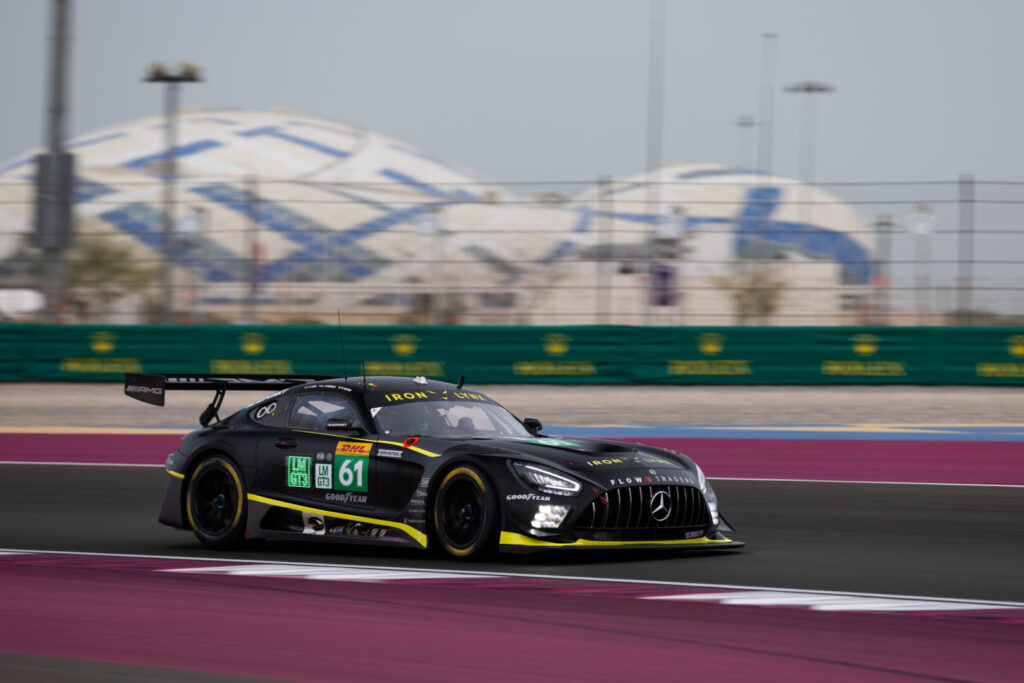
Joining them in the elimination were the Porsches, another shocker as the German manufacturers were the winners in Qatar last time around. Meanwhile, both the McLarens, Lexus’ and Ferraris advanced to the Hyperpole, joining them were #46 BMW of Team WRT, #27 Aston Martin, #81 Corvette and #88 Mustang of Proton.
Sean Gelael put everything together on his push lap to set the benchmark time of 1:54.239 in the #95 United Autosports McLaren. The sister McLaren closed the gap but couldn’t snatch the top spot, settling for second, just 0.239s behind. The Akkodis ASP Lexus pair were split by the Vista AF Corse Ferraris. Valentino Rossi qualified his #46 BMW in eighth, just behind the #27 Aston Martin. The American entries, the #81 Corvette and #88 Ford Mustang, rounded out the top 10.
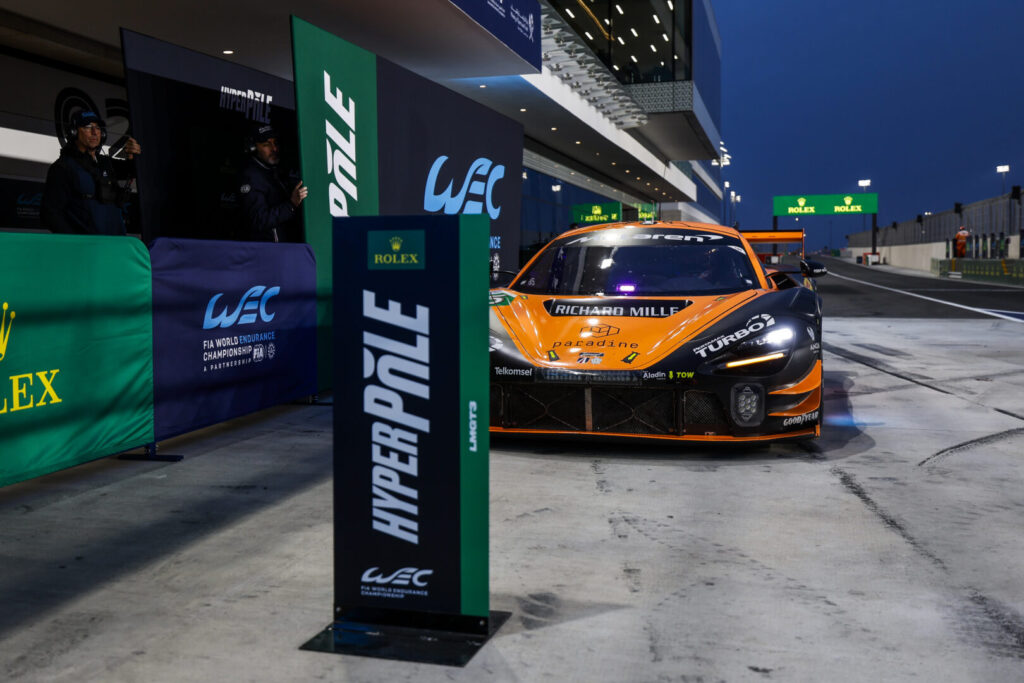
Ferrari Wins WEC Opener in Commanding Fashion
Ferrari left nothing on the table as the Italian manufacturer kicked off its 2025 World Endurance Championship campaign with a dominant 1-2-3 finish at the Qatar 1812KM.
The #51 Ferrari, which started from pole, successfully fended off a charging #50 Ferrari, which had launched from the second row, into Turn 1, holding on to the race lead. From there, the two factory Ferraris began to pull away from the rest of the field. By Lap 21, the #51 led the #50 by five seconds, with both cars over nine seconds clear of the chasing pack.
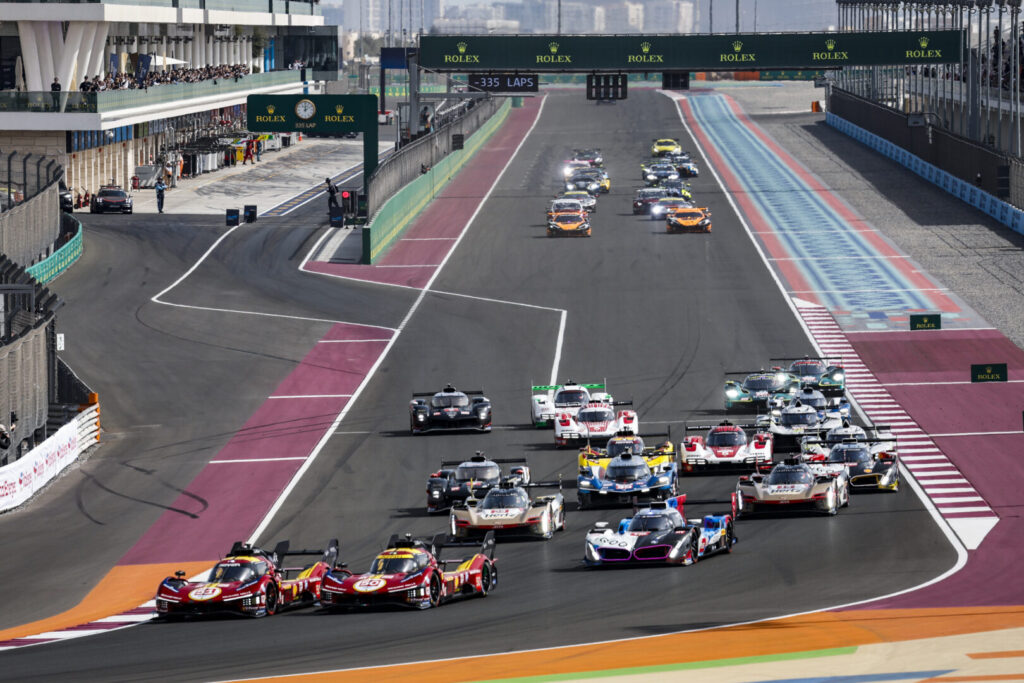
Further back, the two Aston Martins, which had started from the rear of the grid, were steadily making their way through the field. However, drama struck when the #009 Aston Martin was forced into an unscheduled pit stop after the car’s door flew off mid-race.
Things took a dramatic turn around Lap 70 when a full-course safety car was deployed. At the restart, Hertz Team Jota, who had remarkably moved into a 1-2 position, suffered a nightmare scenario—their two cars collided with each other. This handed the race lead back to Ferrari, with the two factory entries ahead of the #83 AF Corse privateer Ferrari.
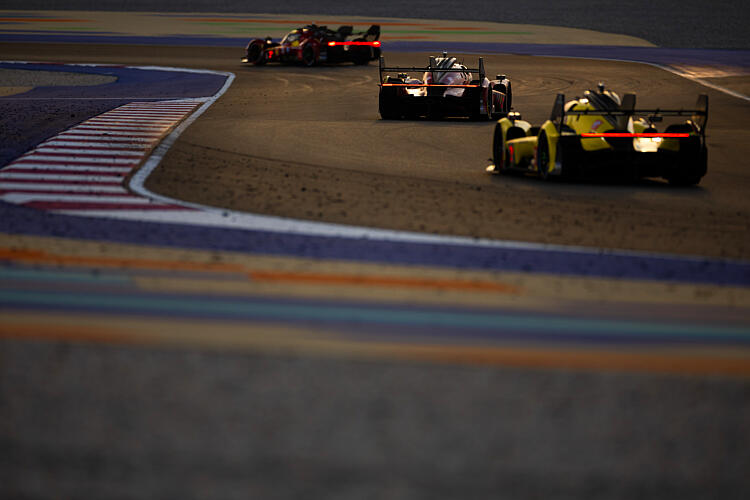
The #51’s race then took a hit when it was handed a drive-through penalty for a Virtual Safety Car (VSC) infringement, dropping it to the tail end of the top 10. That promoted the #50 Ferrari into the lead, until it was spun by the #15 BMW, handing control of the race to the #83 Ferrari.
What followed was a thrilling duel between the #50 and the #83, as both Ferraris battled for the race lead in the final hours.
In the closing stages, Antonio Fuoco delivered a phenomenal stint in the #50 Ferrari, overtaking Robert Kubica in the #83 to reclaim the lead. Behind them, Alessandro Pier Guidi had brought the penalised #51 Ferrari all the way back into podium contention. With fresh tyres, he mounted a late charge on Kubica for second place, but the Polish driver held his ground, finishing just three-tenths of a second ahead to secure second.
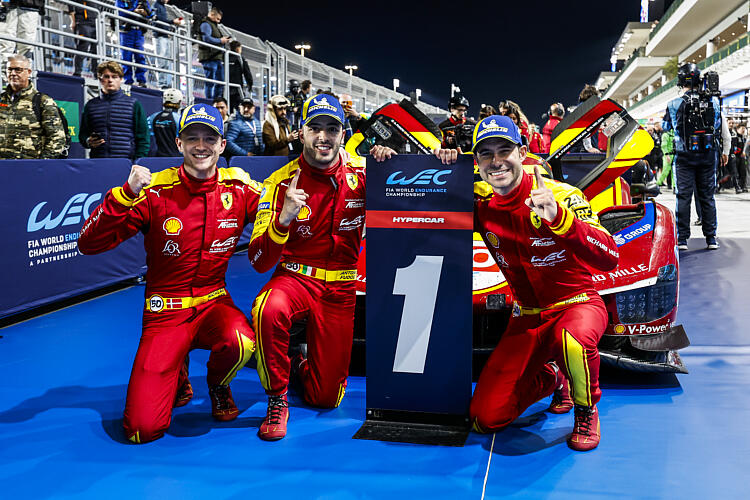
Pier Guidi crossed the line in third, completing a historic Ferrari 1-2-3—their first in top-level endurance racing since the 1,000 Kilometres of Österreichring in 1972.
“First of all, I’d like to thank the whole team for everybody’s work over the winter,” the winner reflected. “We prepared really well and while we had some ups-and-downs in the race, in the end, it obviously worked out well.”
Despite the #15 BMW falling down the order due to a pit speed limiter issue and a clash with an LMGT3 car, it recovered to finish a solid fourth, securing valuable points for the team. The sister car, #20 BMW, crossed the line in seventh. Toyota delivered a strong recovery drive to claim fifth and sixth, with the #8 car leading the charge after starting from the back of the grid.
Cadillac, which at one point was leading the race, could only salvage eighth place for their #12 entry after a costly collision between both of their cars while running at the front.
The #35 Alpine and the #5 Porsche rounded out the top 10. Alpine, despite showing early pace, dropped down the order as the race progressed, while Porsche lacked overall competitiveness throughout the weekend.

Corvette Climbs from the Seventh Row to Win in Qatar
The #33 TF Sport Corvette delivered a stunning comeback drive to win the LMGT3 class at the Qatar 1812KM, fending off the #59 McLaren of United Autosports after starting all the way back in 13th.
United Autosports had locked out the front row in qualifying and got off to a strong start. But it wasn’t long before the #78 Lexus of Akkodis ASP Team overtook them, igniting a fierce four-way battle at the front that included the Lexus, both McLarens, and the #46 BMW—which had climbed up to second after starting eighth on the grid.
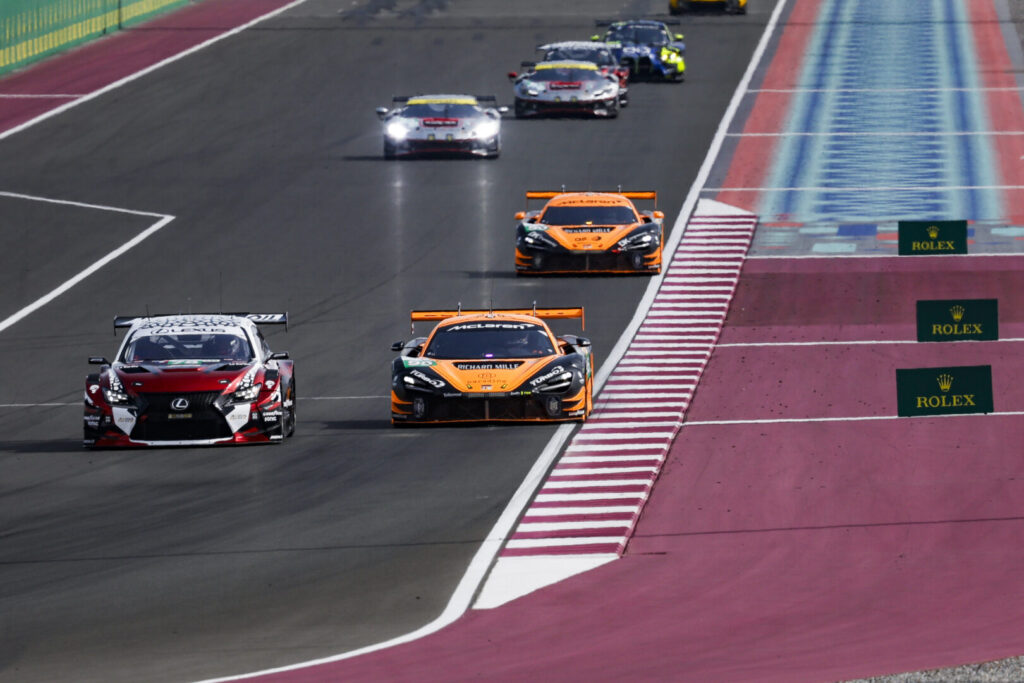
Over four hours into the race, the fight at the front was still intense, with the top five covered by just seven seconds. The #78 Lexus continued to lead, closely shadowed by the two United Autosports McLarens. Meanwhile, the #33 Corvette had begun quietly working its way up the order, picking off cars and gaining momentum as the race wore on.
As the battle continued into the final stages, the LMGT3 podium remained wide open. With the pace and pressure ramping up, the #33 Corvette emerged as a real contender.
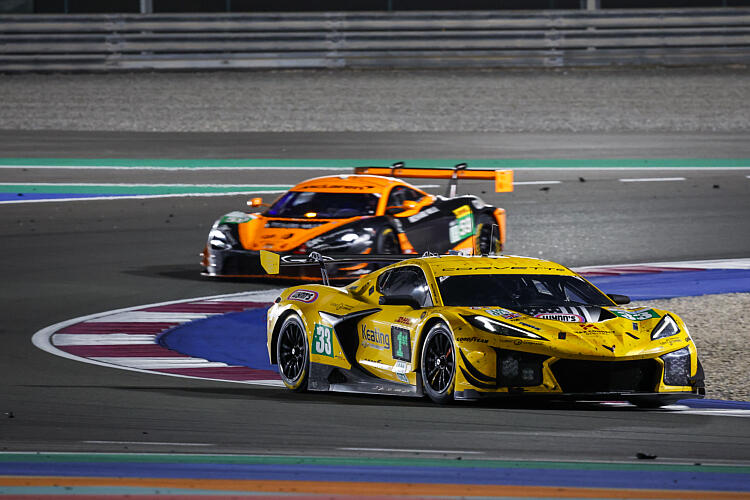
By the end of hour 8, the Corvette had climbed into a podium position, and just one hour later, it took control of the race. The closing laps saw an all-out sprint to the line, but the Corvette held firm, crossing the chequered flag just half a second ahead of the charging #59 McLaren.
Behind them, the #31 BMW of The Bend Team WRT completed the podium after a strong performance throughout the race.
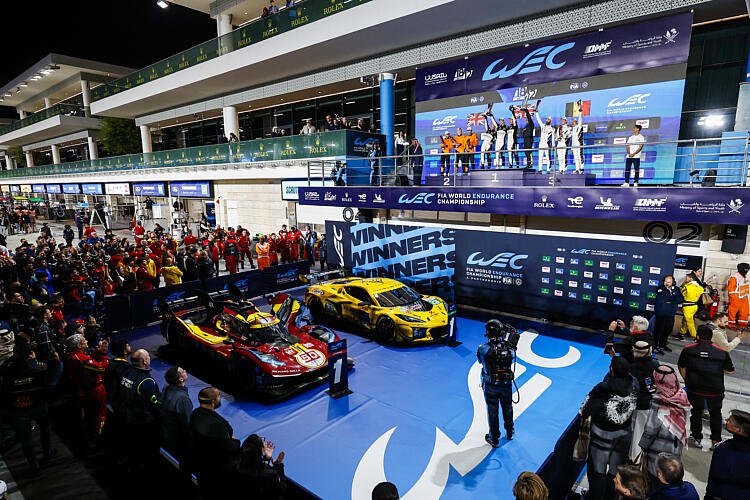
Up Next
After an intense weekend of racing in Qatar, the WEC paddock moves to Ferrari’s home turf for the 6 Hours of Imola from 18th to 20th of April 2025.
Desi Racing Co. is dedicated to bringing the latest updates and insights from the world of motorsport. Whether it’s Formula 1, Formula 2, WEC, MotoGP, Indian motorsports, or other racing series, we’ve got you covered! Stay connected with us for in-depth motorsport coverage. Follow us on Twitter/X, Instagram, and LinkedIn to keep up with the latest motorsport news and updates.
Endurance/Sports car racing
WEC Qatar 1812KM: Epic Battle Begins as Porsche, Toyota, and Ferrari Face Fierce Hypercar Rivals
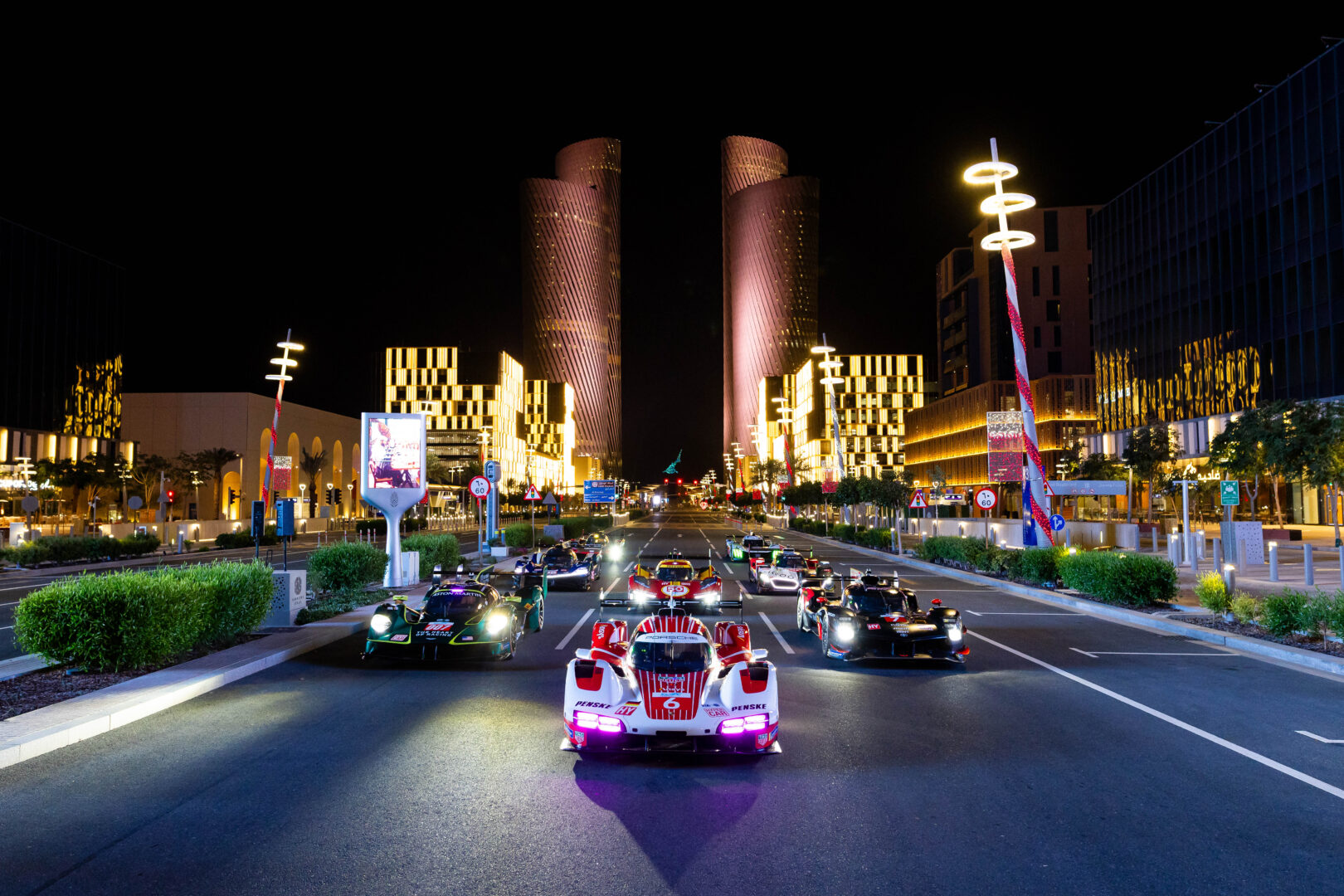
The 2025 FIA World Endurance Championship (WEC) is set to commence with the Qatar 1812km at Lusail International Circuit from February 26 to 28. This season opener promises intense competition, featuring 36 entries across two categories: 18 in Hypercar and 18 in LMGT3. With big names like Toyota, Porsche, Ferrari, Cadillac, Alpine, Peugeot, BMW, and the debuting Aston Martin fielding at least 2 cars in the top class of Endurance racing, this season is promised to be one of the most intense in recent times.
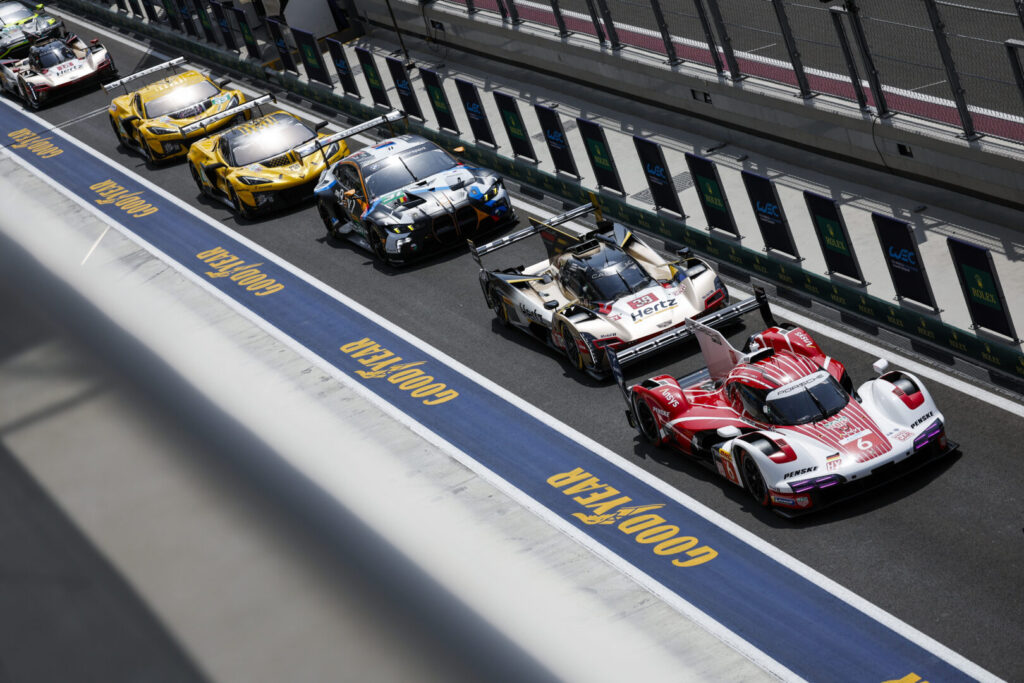
Porsche’s Title Defense and Aspirations
Porsche enters the season having won 4 out of the 5 titles that were on offer last year. They won the Hypercar World Endurance Drivers’ Championship with their #6 Porsche 963, the LMGT3 Drivers and Teams Championship through Manthey PureRxing fielding their Porsche 911 GT3 R, and lastly, the FIA World Cup for Hypercar Teams through their customer team, Hertz Team Jota.
Porsche has had a good start to the year courtesy of their win in the 24 Hours of Daytona. They will be looking to build on this in Losail, a circuit they dominated last year locking out all 3 spots of the podium in Hypercar and taking the top step in GT3. If things go their way, Porsche can do a clean sweep and take all the five titles WEC has to offer this year.
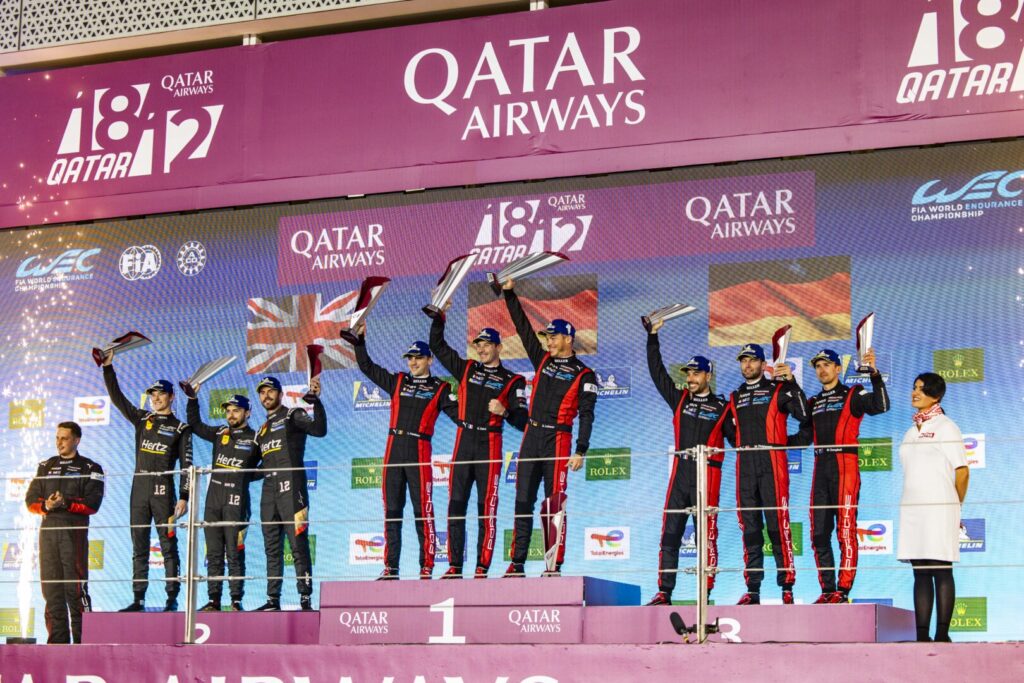
Key challengers: Toyota and Ferrari
Toyota, who had been the dominant force for the past few years in the top class of endurance racing were dethroned by Porsche in 2024. They did however manage to put their hands on the Manufacturers’ Championship. For 2025, Toyota will once again field its proven GR010 HYBRID package, which has undergone no significant changes and will enter its fifth season of competition.
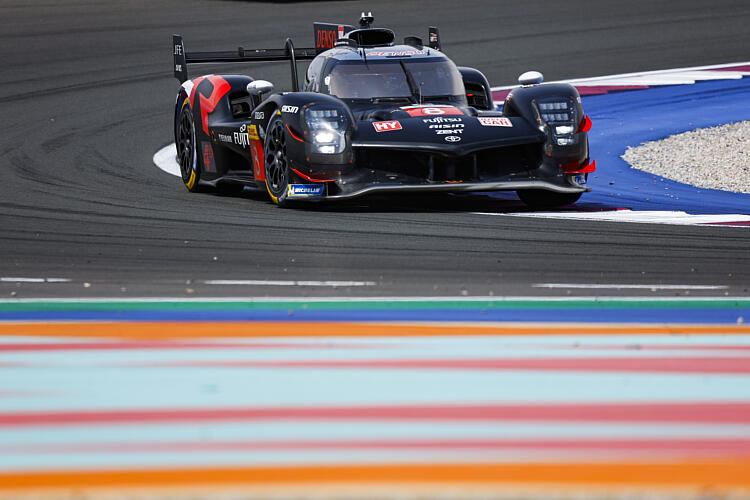
Ferrari joined the hypercar class in 2023, debuting in the season opener 1000 Miles of Sebring. In their first year, Ferrari won the gruelling and prestigious 24h of Le Mans, they repeated this feat again in 2024 with their sister car. Expectations have been high from Ferrari ever since they joined the grid 2 years back but they have not well and truly been the championship contenders. Ferrari would hope that going into their third year in the competition they can constantly fight at the top.
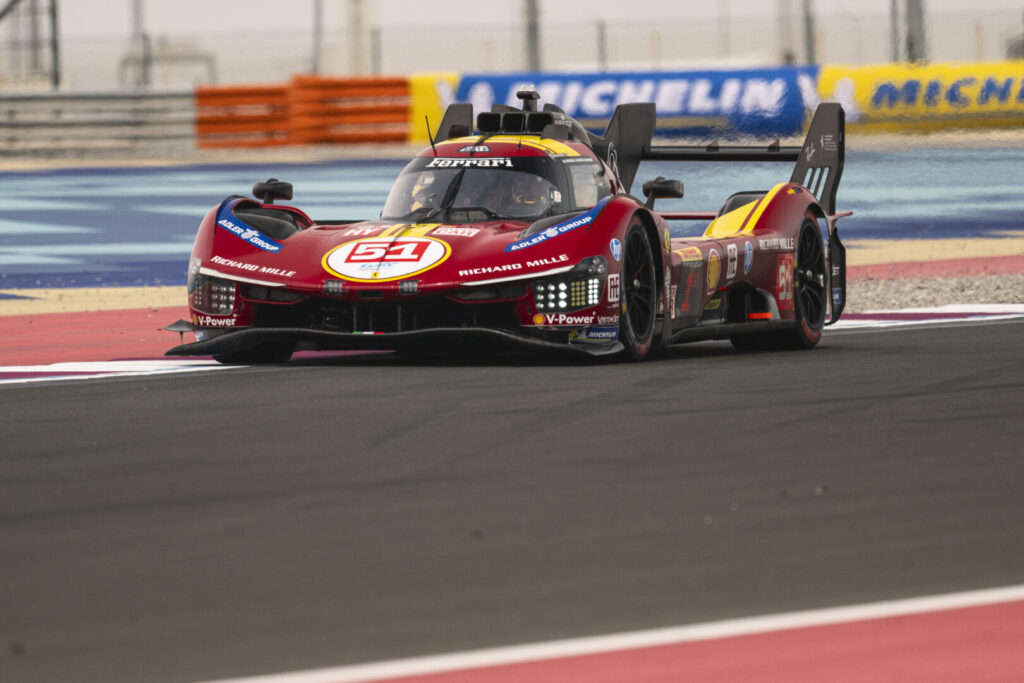
New kids on the WEC block: Aston Martin and Mercedes
The wait is over, the Aston Martin Valkyrie will finally be a part of the WEC grid in 2025. Set to compete in the Hypercar class for the 2025 season, the British manufacturer’s entry turned heads with its unmistakable growl, courtesy of its naturally aspirated V12 engine. The Valkyries are being run by THOR (The Heart of Racing) bearing numbers #007 and #009. The team is very realistic in terms of their approach, they know being outright competitive is difficult, which is why it’s their long-term goal to win the 24 Hours of Le Mans and challenging constantly for wins in WEC. Meanwhile, in the short term, the learning process continues.
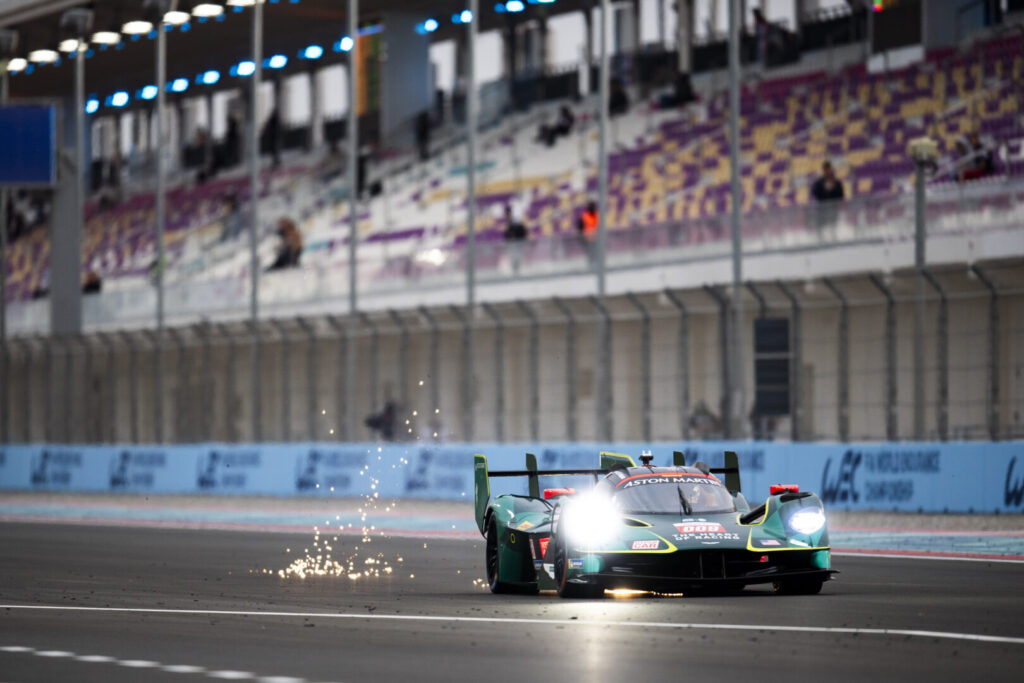
Mercedes is the newest manufacturer to join the GT3 grid in WEC, returning to Le Mans after 26 years. The German manufacturer has teamed up with Iron Lynx who will run two Mercedes-AMG GT3 Evo in the championship. It’s a steep learning curve for the manufacturer and team as Iron Lynx is making a switch from the Lamborghini Huracan LMGT3 EVO2s and it should not come as a surprise that they completed a staggering 1,500 kilometres for both their #60 and #61 LMGT3 participants.

Rossi Returns: The Doctor is back in the BMW
A nine-time world champion on two wheels, Valentino Rossi will return for a second season in the FIA World Endurance Championship, after the Italian was confirmed in the Team WRT line-up for 2025. Rossi enjoyed a positive first-year campaign in the series’ fiercely-disputed LMGT3 category. He finished just shy of the podium on his debut in Qatar, before missing out on the top step of the podium on home soil at Imola. Following a starring turn in the lead of the 24 Hours of Le Mans, a second rostrum result was achieved at Fuji, as the Doctor secured sixth spot in the final championship standings in his #46 BMW M4 LMGT3 with his teammates.
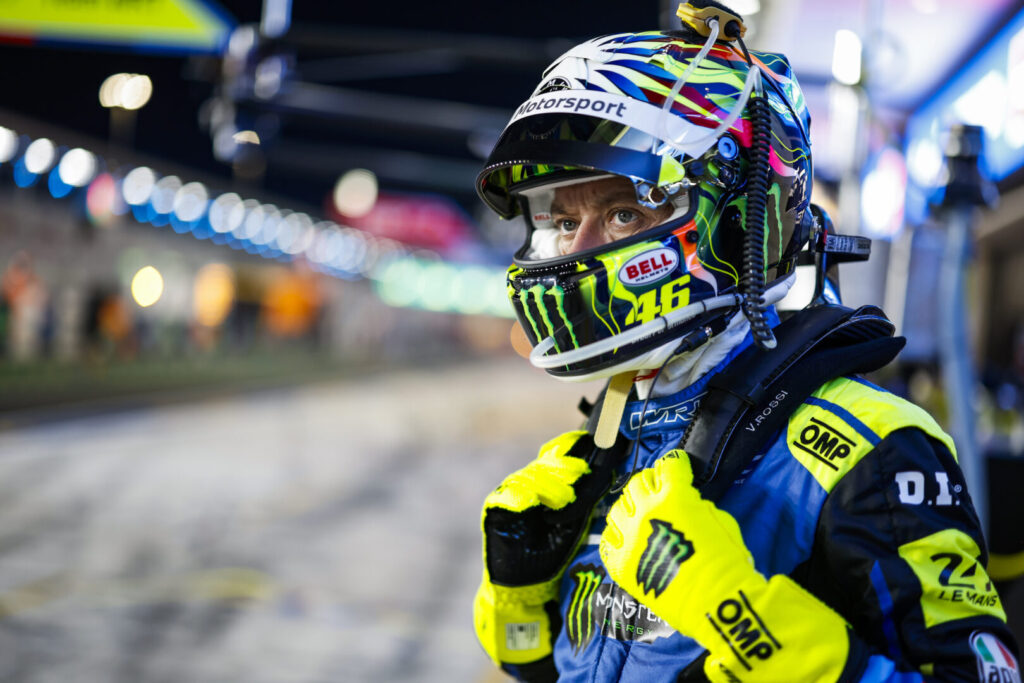
“I’m very happy to continue my experience in FIA WEC, as last year was a strong debut season,” Rossi remarked. “We had some good races, and we want to try to be stronger and faster. We will work hard together with BMW to improve our performance and be more competitive in every race.
Where to Watch and Schedule
The 2025 Qatar 1812KM kicks off at 4:30 PM Indian Standard Time. You can watch all the sessions live on WEC’s Official Streaming Service. You can see the full schedule for the weekend below.
Read more: Mahaveer Ragunathan on his ambitions to join WEC.

-

 Formula 12 years ago
Formula 12 years agoFancode: Everything you need to know before the Bahrain GP
-

 DTM2 years ago
DTM2 years agoDTM 2024: Cars back in action at the Nürburgring GP
-

 Formula 12 years ago
Formula 12 years agoGIFT City’s Formula 1 Racetrack Plans Hit a Roadblock
-

 Formula 13 years ago
Formula 13 years agoFormula 1 in India: A Curious Case
-

 Endurance/Sports car racing1 year ago
Endurance/Sports car racing1 year ago“I Want to Return to Single-Seaters and Reach Formula 1”: Mahaveer Raghunathan on His Ambitions, Challenges, and Racing Journey
-

 Indian Motorsports1 year ago
Indian Motorsports1 year agoGoa Street Circuit Set to Become India’s Newest Motorsport Destination
-

 MotoGP2 years ago
MotoGP2 years agoJio Cinema will be the Indian OTT broadcaster for MotoGP
-

 Formula 12 months ago
Formula 12 months agoINTERVIEW: Everything you need to know about watching Formula 1 on FanCode in 2026









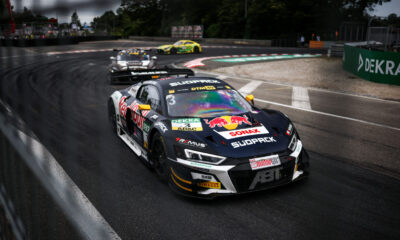



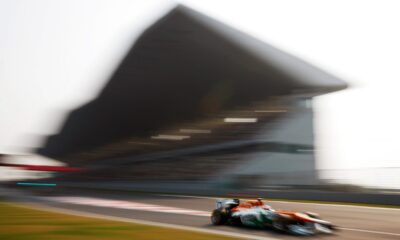

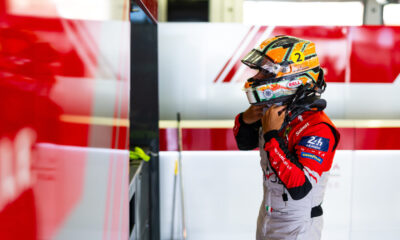

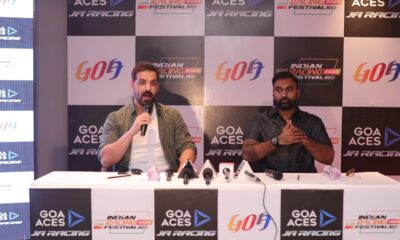




You must be logged in to post a comment Login